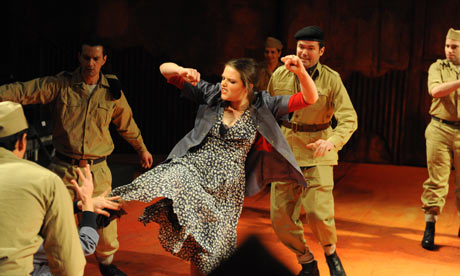Scottish Opera’s occasional opera-in-concert series has been a great platform for works that will never see a main-stage production and here it proved to be so again. This one-off performance was a double bill of one-act operas based on works by Pushkin, apparently a remnant of a Russian opera in concert series that was mothballed by Covid.
For all that this might seem an inopportune moment for Russian opera, the composers Rachmaninov and Stravinsky, both with links to Ukraine, were themselves no strangers to exile and loss. Only Rachmaninov’s work, The Miserly Knight, was written for Russia. Premiered in Moscow in 1906 – and here receiving a very belated Scottish premiere – this is a dark tale of an English baron obsessed with hoarding his wealth and controlling his son through the purse strings while external forces try to manipulate the family dynamic, leading almost inevitably to patricide.
Written for five male voices and with a lush orchestral score rich in writing for dark-hued clarinet and cello, this was a lugubrious yet sumptuous work. The vocal writing provided moments of contrast: particularly the son, Alexey Dolgov in dialogue with money lender Alasdair Elliott, the former’s high-set heroic tenor contrasting with the latter’s reedier character tenor. Most striking was the scene where the Baron, Scottish Opera regular baritone Roland Wood, sits in his cellar surrounded by his treasure. The orchestral score, as sepulchral as the setting, rises to a moment of astonishing metallic-hued ecstasy at the climax, a portent of Bartók’s later Duke Bluebeard’s Castle as well as the closing gesture of Rachmaninov’s great final work, the Symphonic Dances.
Not even two decades separate the composition of The Miserly Knight and Stravinsky’s Mavra, but it might as well be a different world. This is a work from Stravinsky’s Parisian era, a period that encompassed both the calculated primitivism of The Rite of Spring and the cool modernity of Oedipus Rex. Mavra, an epigrammatic comedy about a saucy girl who disguises her lover as a maid in order to smuggle him into the house under the nose of her mother, has a foot firmly in both camps. The music, all spiky sardonic woodwind writing, belongs to the Parisian 1920s of Cocteau and Satie. The vocal writing, by contrast, harks back to the sound world of Tchaikovsky. It’s a short work, but one with a great deal of charm, emphasised here by Anush Hovhannisyan and Dolgov as the pair of lovers. Dolgov, in particular, has great fun in drag has the hapless maid “Mavra” – a complete contrast to his role in the first half of the programme.
Laura Attridge’s minimal props and stage direction added a little visual interest to accompany excellent vocal performances without being obtrusive. The biggest star of the evening, however, was the orchestra of Scottish Opera and conductor Stuart Stratford who gave fine, nuanced accounts of these two very different scores.








